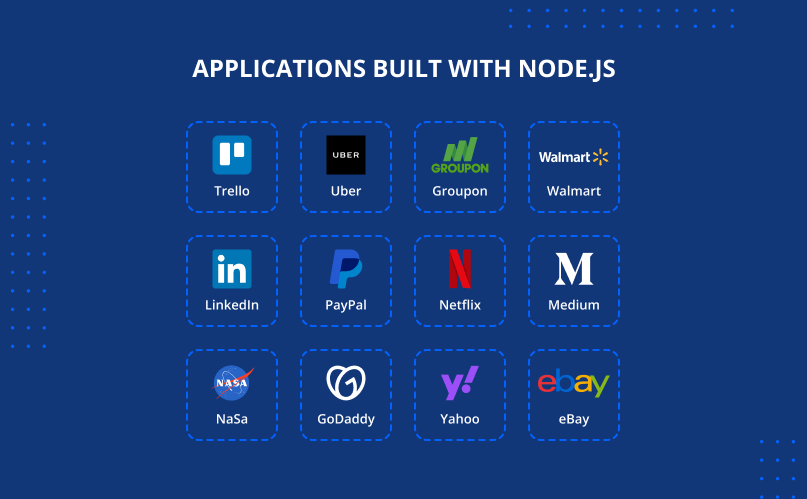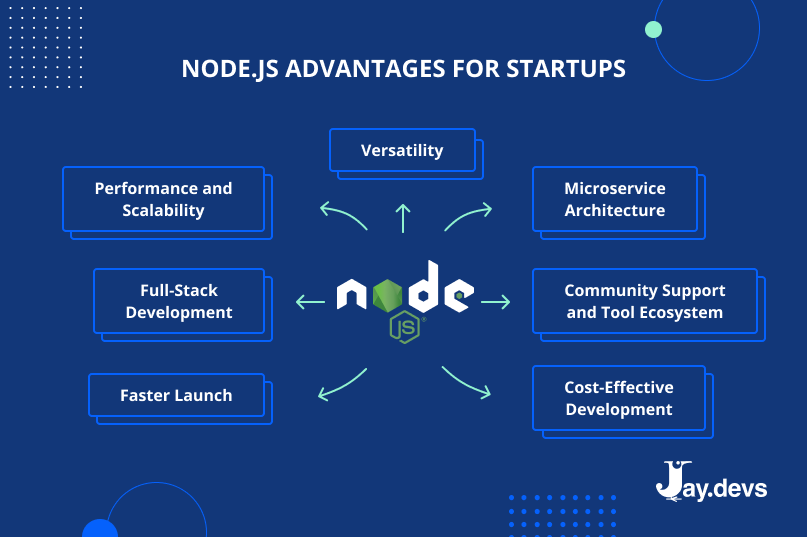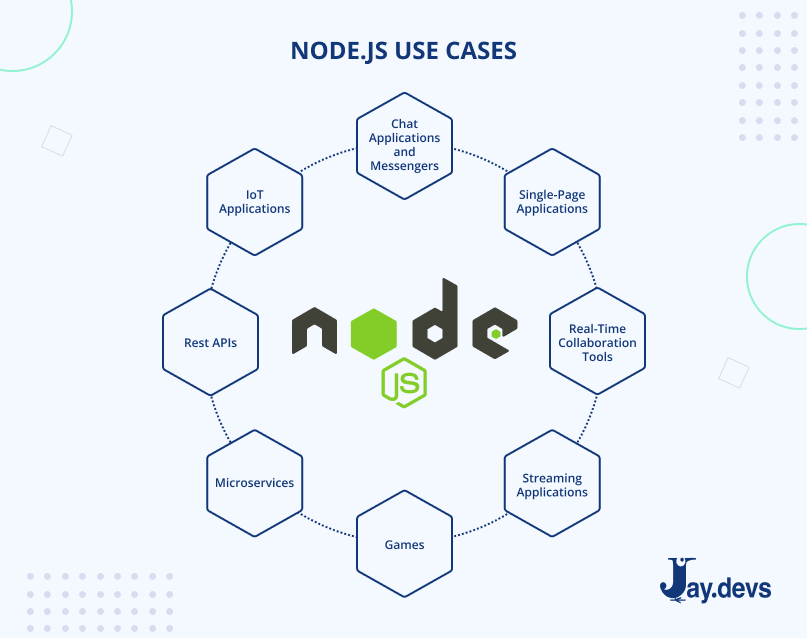In the fiercely competitive world of startups, technology choices can bring about a huge difference. Therefore, startups should place heavy consideration when selecting the foundation of their digital infrastructure, as it can significantly impact their ability to grow and innovate.
Node.js is among the technologies capturing the attention of entrepreneurs and engineers alike. Node.js expanded the use of JavaScript to the back end and has become a leading technology for web development. Like Uber, Trello, and Groupon, former unicorns embrace Node.js for scalability, performance, and other features vital for user-centric applications.
In this article, we’ll shed light on what Node JS is used for in the modern realm and how it empowers small businesses and startups. We’ll uncover 7 distinct Node.js advantages and share tips on leveraging this technology to its full capacity.
Is Node JS Still Relevant in 2024?
To answer the question, it is worth considering the demand for Node.js and the core features it brings to the table.
Node.js, a JavaScript runtime environment, was introduced in 2009. Currently, it keeps gaining traction, which is reflected in an increasing hiring trend for Node.js engineers:
Its popularity stems from a unique capability to use JavaScript, which is a front-end technology, on the server side as well. This enables businesses to mitigate common complexities, such as long-time development processes or complicated app maintenance.
The architecture of Node.js has streamlined the creation of real-time applications, which have been in demand for a while (games, chat apps, social media). It allows for handling multiple concurrent connections without blocking them. Therefore, Node.js applications can operate as a well-regulated highway, where cars keep going without being stuck in traffic jams.
Furthermore, Node.js is continuously updated by the OpenJS foundation and its community to address the latest tech requirements.
Given these peculiarities, Node.js is not just relevant but highly adopted by startups that prioritize speed and flexibility.
Is Node JS Good for Startups?
Most successful businesses have gone through multiple pivots, adapting their business model and updating their software accordingly. To navigate these changes under limited resources and budgets, starting businesses require a highly agile tech stack. That’s precisely what Node.js offers for startups.
One of the significant Node.js advantages is its flexible architectural pattern. Unlike Django (a Python framework) or Java, Node.js doesn’t dictate a strict approach to creating web apps, thereby providing more freedom for customizations. Additionally, sharing the JavaScript code for client and server sides naturally leads to faster iterations.
With Node.js, startups can quickly build product prototypes and make efficient changes in no time.
Successful Use Cases of Node.js for Startups
Once startups, companies like Trello, Uber, and Groupon leverage Node.js to their success. Let’s examine their experience:
- Trello: A prime example of a single-page application, Trello is now a well-known collaboration tool. Trello’s team tried out Node.js for their server prototype and later fully embraced the technology in production. The unicorn admits that Node.js’ simplicity enabled them to experiment and quickly roll out the final product.
- Uber: The company claims they were among pioneering startups who deployed Node.js in production. The major functionalities of Uber are based on Node.js, such as their core trip execution engine. It processes real-time connections and allows for the provision of a growing base of riders and drivers.
- Groupon: An established eCommerce platform was originally built with Ruby on Rails, Java, and PHP. As the platform grew, the monolithic web architecture became complicated to maintain. Groupon transitioned to Node.js microservices, providing a unified development experience and improving performance and scalability.
While Trello and Uber chose Node.js from the start, Groupon migrated its platform to Node.js to meet growing business demands. Drawing inspiration from these cases, you can align your business ideas with Node.js capabilities and establish a solid foundation for your future product.
7 Advantages of Node.js
Using Node.js for startups enables them to scale, innovate, and succeed in a competitive market. Having a complete overview of Node.js advantages may help you make a future-proof decision for your product.
1. Performance and Scalability
Among the first and foremost advantages of Node.js for startups is its ability to perform well under significant traffic leaps.
Node.js relies on the V8 JavaScript engine, which is known for its great performance. At the output, you get applications that respond fast and provide a smooth experience for end users.
The ability to scale is another pillar for successful growth over time. Luckily, Node.js utilizes non-blocking, event-driven architecture to efficiently handle increasing events generated by users.
Working with Node.js, startups can diminish time-consuming performance optimizations, enter the market confidently, and scale on demand.
2. Full-Stack Development
As mentioned, one of the outstanding Node.js advantages is the ability to use JavaScript alone for client-side and server-side development.
This eliminates the need to use multiple languages and allows the creation of full-stack solutions with the help of frameworks like Express.js.
This increased productivity is particularly valuable for small teams, which are commonly found in startups.
3. Faster Launch
With its lightweight and modular nature, Node.js brings a lot to the accelerated development process.
In this manner, engineers can iterate new features rapidly, make faster deployments, and wrap up business ideas into Minimum Viable Products (MVPs) to test the waters.
Node.js helps startups validate their ideas in the market and make product enhancements in shorter periods of time.
4. Microservice Architecture
Node.js works exceptionally well in a microservices architecture, where an application is divided into smaller parts that communicate with each other.
By breaking down the application into independent services, startups can enhance fault isolation and ease of maintenance. Each microservice can also be scaled separately, enabling engineers to hit specific application bottlenecks with ease.
This modularity promotes high flexibility from the get-go and offers adaptability to changing environments.
5. Community Support and Tool Ecosystem
Among notable Node.js advantages are a thriving community of developers. Product teams can rely on extensive documentation and tutorials and benefit from collective knowledge.
The active Node.js community regularly shares pre-built modules and packages that are free to use. These tools are available through Node Package Manager (NPM) and can cover many basic app functionalities.
Such strong community support helps to avoid reinventing the wheel and expedites troubleshooting.
6. Cost-Effective Development
Given the full-stack nature and faster time-to-market, Node.js significantly reduces overhead for startups.
Node.js promotes integrated development, meaning you can deliver products with fewer people and save expenses on the hiring process as well.
Additionally, Node.js supports cross-platform development, eliminating the need to create separate apps for each operating system. This can be a step to targeting a broader audience with fewer expenses.
As startups typically work under talent and funding constraints, Node.js can be a particularly beneficial technology that increases return on investments.
7. Versatility
Another benefit of Node.js for startups is its remarkable versatility, which enables them to build a wide range of solutions.
From chat applications and APIs to eCommerce platforms and IoT solutions — once you have a strong product vision, you can start setting up a proper development team.
This multi-functionality allows startups to pivot as their business needs evolve without requiring huge investments.
Anyway, what is Node JS used for?
Core Steps to Unlock All Node.js Pros
While Node.js offers a plethora of advantages for startups, maximizing its potential requires at least two strategic decisions:
- Make sure that Node.js is the very technology that covers your business needs. Comparing its unique features with other technologies can be valuable in making your final decision.
- Look for skilled professionals and affordable hiring options.
Step 1: Compare the Advantages of Node.js Over Other Backend Languages
By comparing the Node.js advantages with other popular technologies like Java and Python, startups can identify the technology that best aligns with their unique objectives.
Careful evaluation of business-critical differences may help you make informed decisions and optimize costs.
Step 2: Seek Experienced Node JS Developers
To ensure your project is well-handled, it’s better to establish a team of skilled engineers from the outset.
Experienced developers understand the intricacies of the technology, know its advanced features, and can practically help you unlock the full potential of Node.js for startups.
Naturally, skilled engineers are paid more than junior ones. However, making trade-offs in favor of lower labor costs can lead to poor quality and higher expenses in the long run. So, how can we find a balanced solution when budgets are tight and time is running out?
To expedite the process, consider hiring remote Node JS developers. This widens the geographical boundaries and often leads to lower hourly rates. By reaching out to staff augmentation companies, you can choose from a pool of already vetted and qualified Node.js specialists at reasonable prices.

An alternative is outsourcing the entire project to a reputable software development vendor. If you have several projects to handle, you can omit the complexities of building separate in-house teams for each.
Conclusion
Node.js can be the driving force behind a startup’s success, thus providing a competitive edge. It significantly simplifies development, offering high performance and scalability and enabling full-stack development.
Whatever the project may be, fledgling companies should equip their teams with skilled engineers to leverage the advantages of using Node.js to the maximum. With the right talent, businesses can truly deliver quickly and grow effectively.
The good news: You don’t need to go very far. At JayDevs, we provide dedicated Node JS developers and teams to translate your vision into functional products.
Contact JayDevs, and get access to the senior and lead specialists to boost project delivery!















